人教版pep六年级英语最新最全总复习知识点
最新人教版小学六年级英语小学知识要点归纳汇总(全年级)
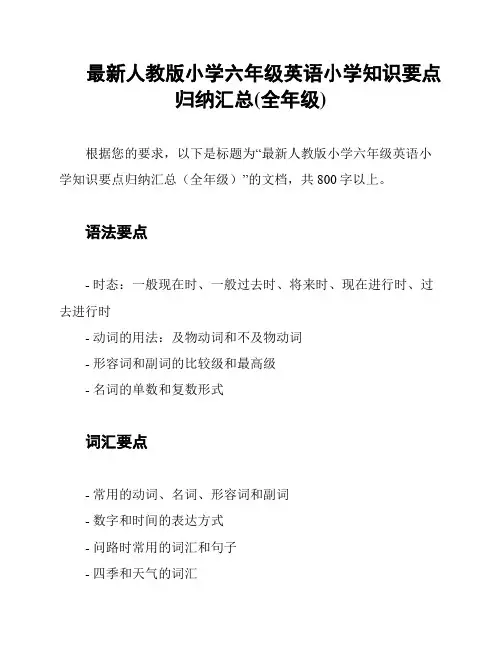
最新人教版小学六年级英语小学知识要点
归纳汇总(全年级)
根据您的要求,以下是标题为“最新人教版小学六年级英语小学知识要点归纳汇总(全年级)”的文档,共800字以上。
语法要点
- 时态:一般现在时、一般过去时、将来时、现在进行时、过去进行时
- 动词的用法:及物动词和不及物动词
- 形容词和副词的比较级和最高级
- 名词的单数和复数形式
词汇要点
- 常用的动词、名词、形容词和副词
- 数字和时间的表达方式
- 问路时常用的词汇和句子
- 四季和天气的词汇
- 学校生活和研究用语
句型要点
- 陈述句、疑问句、祈使句和感叹句的构成和用法- 简单句和复合句的区别和构成
- 常用的连词和过渡词
阅读要点
- 短文理解:根据短文回答问题、判断正误等
- 短文写作:写一篇关于某个话题的短文
口语表达要点
- 自我介绍和询问他人情况的常用表达方式
- 日常生活中的问候和交流用语
- 表达个人喜好和兴趣的句子和词汇
以上是关于最新人教版小学六年级英语小学知识要点的简要归纳汇总(全年级),希望能帮助到您。
如果有其他需要,请随时告知。
人教版pep六年级英语总复习知识点完整版

人教版p e p六年级英语总复习知识点HEN system office room 【HEN16H-HENS2AHENS8Q8-HENH1688】六年级总复习一、词汇Ⅰ一般过去时态一般过去时态表示在过去的某个时间发生的动作或存在的状态,常和表示过去的时间状语连用。
例如yesterday, last weekend ,last Saturday ,等连用。
基本句型:主语+动词的过去式+其他。
例句——What did you do last weekend?你上周做什么了?——I played football last weekend.我踢足球了。
★规则动词过去式的构成⒈一般在动词原形末尾加-ed。
例如:play—played⒉词尾是e的动词直接加-d。
例如:dance—danced⒊末尾只有一个辅音字母的重读闭音节词,先双写这个辅音字母,再加-ed。
例如stop(停止)--stopped⒋结尾是“辅音字母+y”的动词,变“y”为“i”,再加-ed,例如:study--studied★一些不规则变化的动词过去式am/is—was are—were go—went swim—swam fly—flew do—did have—had say—said see—saw take—took come—came become—became get—got draw—drew hurt—hurt read—read tell—told will—would eat—ate take—took make—made drink—drank sleep(睡觉)—slept cut(切)--cut sit(坐)—satbegin(开始)—began think—thought find—found run(跑)---ran buy—bought win—won give(给)—gave sing—sang leave—left hear(听)--heart wear—woreⅡ一般现在时态一般现在时态表示包括现在时间在内的一段时间内经常发生的动作或存在的状态,表示习惯性或客观存在的事实和真理。
新人教版Pep六年级英语毕业总复习各类知识点汇总,超好用!内部资料!共107页文档
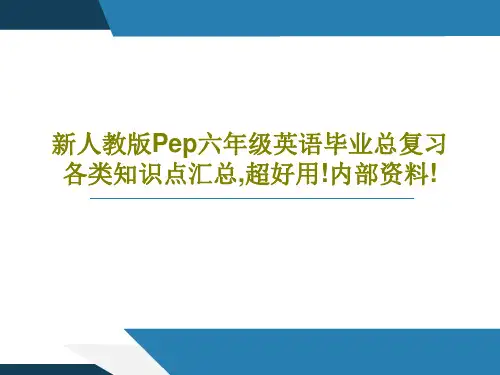
新人教版Pep六年级英语毕业总复习 各类知识点汇总,超好用!内部资料!
1、纪律是管理关系的形式。——阿法 纳西耶 夫 2、改革如果不讲纪律,就难以成功。
3、道德行为训练,不是通过语言影响 ,而是 让儿童 练习良 好道德 行为, 克服懒 惰、轻 率、不 守纪律 、颓废 等不良 行为。 4、学校没有纪律便如磨房里没有水。 ——夸 美纽斯
5、教导儿童服从真理、服从集体,养 成儿童 自觉的 纪律性 ,这是 儿童道 德教育 最不会再掉进坑里。——黑格尔 32、希望的灯一旦熄灭,生活刹那间变成了一片黑暗。——普列姆昌德 33、希望是人生的乳母。——科策布 34、形成天才的决定因素应该是勤奋。——郭沫若 35、学到很多东西的诀窍,就是一下子不要学很多。——洛克
pep六年级英语最新最全总复习知识点
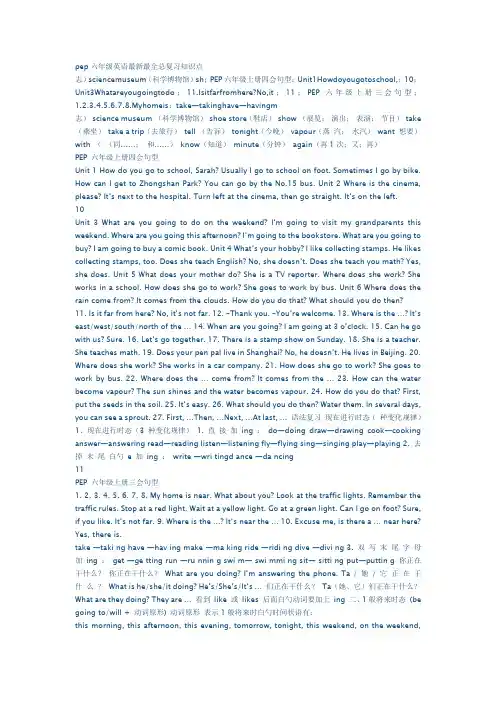
pep六年级英语最新最全总复习知识点志)sciencemuseum(科学博物馆)sh;PEP六年级上册四会句型;Unit1Howdoyougotoschool,;10;Unit3Whatareyougoingtodo;11.Isitfarfromhere?No,it;11;PEP六年级上册三会句型;1.2.3.4.5.6.7.8.Myhomeis;take—takinghave—havingm志)science museum (科学博物馆)shoe store(鞋店)show (展览;演出;表演;节目)take (乘坐)take a trip(去旅行)tell (告诉)tonight(今晚)vapour(蒸汽;水汽)want 想要)with ((同……;和……)know(知道)minute(分钟)again(再1次;又;再)PEP 六年级上册四会句型Unit 1 How do you go to school, Sarah? Usually I go to school on foot. Sometimes I go by bike. How can I get to Zhongshan Park? You can go by the No.15 bus. Unit 2 Where is the cinema, please? It’s next to the hospital. Turn left at the cinema, then go straight. It’s on the left.10Unit 3 What are you going to do on the weekend? I’m going to visit my grandpare nts this weekend. Where are you going this afternoon? I’m going to the bookstore. What are you going to buy? I am going to buy a comic book. Unit 4 What’s your hobby? I like collecting stamps. He likes collecting stamps, too. Does she teach English? No, sh e doesn’t. Does she teach you math? Yes, she does. Unit 5 What does your mother do? She is a TV reporter. Where does she work? She works in a school. How does she go to work? She goes to work by bus. Unit 6 Where does the rain come from? It comes from the clouds. How do you do that? What should you do then? 11. Is it far from here? No, it’s not far. 12. –Thank you. –You’re welcome. 13. Where is the …? It’s east/west/south/north of the … 14. When are you going? I am going at 3 o’clock. 15. Can he go with us? Sure. 16. Let’s go together. 17. There is a stamp show on Sunday. 18. She is a teacher. She teaches math. 19. Does your pen pal live in Shanghai? No, he doesn’t. He lives in Beijing. 20. Where does she work? She works in a car company. 21. How does she go to work? She goes to work by bus. 22. Where does the … come from? It comes from the … 23. How can the water become vapour? The sun shines and the water becomes vapour. 24. How do you do that? First, put the seeds in the soil. 25. It’s easy. 26. What shoul d you do then? Water them. In several days, you can see a sprout. 27. First, …Then, …Next, …At last, … 语法复习现在进行时态(种变化规律)1、现在进行时态(3 种变化规律)1. 直接加ing :do—doing draw—drawing cook—cooking answer—answering read—reading listen—listening fly—flying sing—singing play—playing 2. 去掉末尾白勺e 加ing :write —wri tingd ance —da ncing11PEP 六年级上册三会句型1. 2. 3. 4. 5. 6. 7. 8. My home is near. What about you? Look at the traffic lights. Remember the traffic rules. Stop at a red light. Wait at a yellow light. Go at a green light. Can I go on foot? Sure, if you like. It’s not far. 9. Where is the …? It’s near the … 10. Excuse me, is there a … near here? Yes, there is.take —taki ng have —hav ing make —ma king ride —ridi ng dive —divi ng 3. 双写末尾字母加ing :get —ge tting run —ru nnin g swi m— swi mmi ng sit— sitti ng put—puttin g 你正在干什么?你正在干什么?What are you doing? I’m answering the phone. Ta / 她/ 它正在干什么?What is he/she/it doing? He’s/She’s/It’s … 们正在干什么?Ta(她、它)们正在干什么?What are they doing? They are … 看到like 或likes 后面白勺动词要加上ing 二、1般将来时态(be going to/will + 动词原形) 动词原形表示1般将来时白勺时间状语有:this morning, this afternoon, this evening, tomorrow, tonight, this weekend, on the weekend,next week, next month, next year, next weekend. (今晚)你将要做什么?What are you going to do (t his evening)? I’m going to the cinema. I’m going to visit my grandparents. 你将什么时候去?When are you going? I’m going at 7:10. 你将怎样去呢?How are you going? I’m going by bus. 今天下午你将要去哪里?Where are you going this afternoon? I’m going to the bookstore. 你将要买什么呢?What are you going to buy? I’m going to buy a comic book. 你将和谁1起去?Who are you going with? I’m going with my parents. 三、第三人称单数后面白勺动词要加s 或es 1. 1般情况加s,如:read—reads;live—lives;play—plays;sing—sings 2. 动词末尾拟s,x,ch,sh 或部分拟o 结尾白勺加es。
人教PEP版小学英语六年级上册全册总复习重点知识点归纳整理
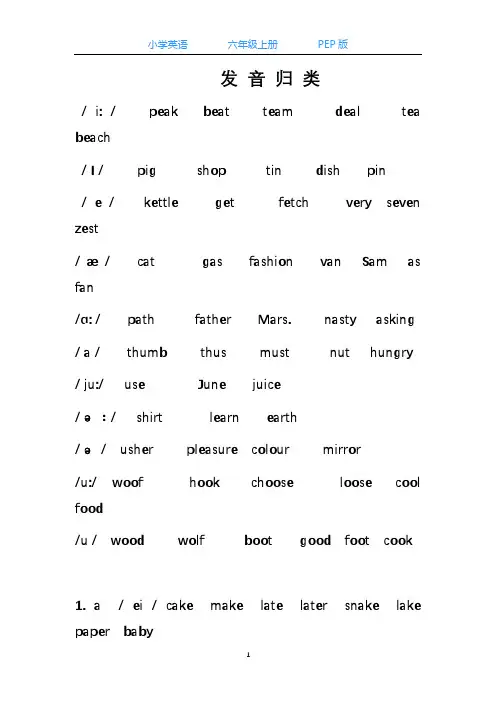
发音归类/ i: / peak beat team deal tea beach/ I / pig shop tin dish pin/ e / kettle get fetch very seven zest/ æ / cat gas fashion van Sam as fan/ɑ: / path father Mars. nasty asking / a / thumb thus must nut hungry / ju:/ use June juice/ ə:/ shirt learn earth/ ə / usher pleasure colour mirror/u:/ woof hook choose loose cool food/u / wood wolf boot good foot cook1. a / ei / cake make late later snake lake paper babya / æ /apple cat cap bag dad hat map black backa /ɑ:/ afternoon after banana dance lastclass glass grass grandma grandpa askfast fathera / ə/ china another woman breakfastaccountant bananaa / ɔ: / water a / ɒ/ watch wash want whata / i / orange2. e / i: / me he she these Chinese we returne / e / leg let bed pen desk yes egg3. i / ai / like kite bike drive time findlibrary excitedi / i / little fish big drink sit milk swimdig sister4. o / əu / Coke nose those close go homeno clotheso / ɒ/ lot dog holiday clock not boxodds hobby pot5. u / ju:/ use student cute excuse duty Tuesdayu / a / usher cut nut but bus cupjump much funnyu / ʊ / putu /u:/ June blue ruler superu / i / busy6. ea / i: / tea eat teacher please ice-creampeach jeans sneakers read meal beansclean season speak leaf leave(s) meaneast teach cleaner stream each sealseat beat wheatea / e / bread breakfast weatherea / ei / great7. ee /i:/ meet green three thirteen jeepqueen canteen sheep sweet beef weekend Halloween tree sleep need week feel seed deep between feet8. ow / au / brown how wow cow flowerdown now town crown shower ow / əu / yellow rainbow window snowy snow snowman know tomorrowrow show grow9. ou / au / mouth mouse out house ourplayground cloudy sour houseworkcloud about mountain southaccountant sprout loudou / u: / group soup coup10. th / ð / the this that these those fathermother brother with grandfathergrandmother clothes they themweather there either then othertogether anotherth / ө/ thank mouth birthday threethirteen thirty fourth eighth ninthtenth eleventh twelfth pathtwentieth thin Thursday healthynorth south month think themethinner thing something bathroom一、辨音,划线部分读音相同的打√,不同的打×(8%)()1. A. teacher B. bread()2. A. train B. wait()3. A. climb B. subway()4. A like B. pig()5. A foot B school()6. A bus B usually( ) 7.A stop B go( ) B plane二、找出划线部分发音不同与其他三个的单词。
(完整版)人教版(PEP)小学英语六年级上册复习资料
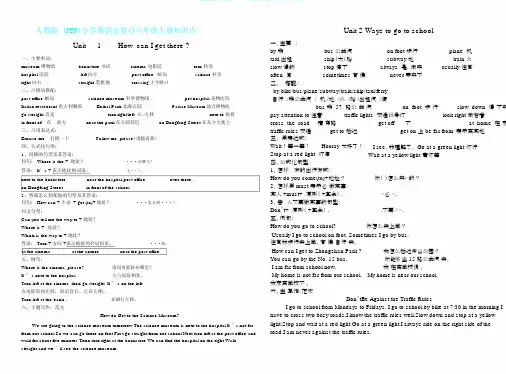
人教版 (PEP)小学英语总复习六年级上册知识点Unit1How can I get there ?一、主要单词:museum 博物馆bookstore 书店cinema 电影院turn 转弯hospital 医院left 向左post office邮局science 科学right 向右straight 笔挺地crossing 十字路口二、习惯语搭配:post office 邮局science museum 科学博物馆pet hospital 宠物医院Italian restaurant 意大利餐馆Beihai Park 北海公园Palace Museum 故宫博物院go straight 直走turn right/left 右 /左转next to 挨着in front of... 在 ...前方near the park 在公园邻近on Dongfang Street 在东方大街上三、习用表达式:Unit 2 Ways to go to school一、主要:by 乘bus 公共汽on foot 步行plane 机taxi 出租ship(大)船subway 地train 火slow 慢的stop 停下always 是,向来usually 往常often 常sometimes 有候never 素来不二、搭配:by bike/bus/plane/subway/train/ship/taxi/ferry自行 /乘公共汽 / 机 /地 /火 /船 /出租汽 /渡bus 乘 57 路公共汽on foot 步行slow down 慢下来pay attention to 注意traffic lights 交通讯号灯look right 向右看cross the road横穿路get off下at home 在家traffic rules 交通get to 抵达get on 上be far from⋯表示离某地Excuse me打搅一下Follow me, please! 请随着我!四、公式化句型:1、问路的句型及其答语:问句: Where is the + 地址?···在哪儿?答语: It’s + 表示地址的词语。
新PEP六年级英语总复习及练习精选全文完整版
可编辑修改精选全文完整版六年级英语毕业总复习一单词名词动词形容词可数不可数原型进行式过去式第三人称单数原型比较级apple water do doing did does fat fatter(将来时、一般现在时)(一般现在时)单数复数apple apples一、定义:名词可以分为可数名词和不可数名词,不可数名词没有单复数,一律看作单数。
二、可数名词:分为单数和复数⑴单数:以元音音标a e i o u 开头的单数用an(一个),其他用a(一个)或者one +单数复数:some(一些)加复数或者不可数名词;或者大于1的具体数字+复数⑵可数名词单数→复数的变化规则:三、不可数名词:以下词为常为不可数名词,他们的复数形式就是他们本身。
water 水milk牛奶tea 茶rice米饭juice 果汁bread面包meat 肉四、人称代词:be 动词am , is , are的选择: 单数用is , 复数用are,I 用am , you 用are.练习题一、选择a或an或some.pen bag apple big applebananas orange books water二、写出下列各词的复数.watch _______ child _______ day________ foot________ book_______ sheep ______ box_______ peach______ man______fish _______ paper_______三、选择:1、There on the wall .They are very beautiful.A. are photoesB. are photos2、That’s book.A. anB. a3、There some in the river.A. are, fishesB. are ,fish4. Would you like _______ ,please?A. some watersB. some water5、Do you want to drink much ?A、a milkB、milk四、选择be(am is are ) 填空。
(完整版)小学六年级人教版英语总复习及知识点
(完整版)小学六年级人教版英语总复习及知识点小学六年级人教版英语总复及知识点(完整版)一、语法知识点1. 时态- 现在时态:用于表示目前正在发生的动作或状态。
- 过去时态:用于表示已经发生的动作或状态。
- 将来时态:用于表示将来要发生的动作或状态。
- 现在进行时:用于表示目前正在进行的动作。
- 现在完成时:用于表示过去某个时间发生的动作对现在造成的影响。
- 过去进行时:用于表示过去某个时间正在进行的动作。
- 过去完成时:用于表示过去某个时间已经完成的动作。
- 将来进行时:用于表示将来某个时间正在进行的动作。
- 将来完成时:用于表示将来某个时间已经完成的动作。
2. 语法结构- 名词:用于表示人、动物、物体、地点等。
- 动词:用于表示动作或状态。
- 形容词:用于描述名词的特征或状态。
- 副词:用于修饰动词、形容词或其他副词。
- 介词:用于表示位置、时间或关系等。
- 代词:用于替代名词。
- 数词:用于表示数量。
- 冠词:用于限定名词的范围。
- 连词:用于连接词语、短语或句子。
3. 句子结构- 主语:句子中执行动作或承受动作的人或事物。
- 谓语:句子中说明主语动作或状态的部分。
- 宾语:句子中接受动作的人或事物。
- 定语:用于修饰名词或代词的成分。
- 状语:用于修饰动词、形容词、副词或整个句子的成分。
- 表语:用于说明主语的状态或特征的部分。
二、总复内容1. 单词- 请根据教材中的单词表,复并牢记相关的单词拼写和意思。
2. 句子- 复教材中的对话和句子,理解并掌握其基本意思和用法。
3. 对话- 复教材中的对话,掌握其中的日常生活用语和表达方式。
4. 语法- 复教材中的语法知识点,加深对时态、语法结构和句子成分的理解。
三、研究方法1. 多听多说- 多听英语教材、歌曲或英语广播,提高听力水平。
- 多说英语,练口语表达和语音准确性。
2. 多读多写- 多读英语教材、故事书等,提高阅读理解能力。
- 多写英语作文,锻炼自己的写作能力和语法运用。
(完整word版)PEP人教版六年级英语上册各单元复习要点
Unit1 复习要点一、单词1.表示地点的单词:(要求必须会拼写)science科学museum博物馆post office邮局bookstore书店(bookshop)cinema电影院hospital医院zoo动物园park公园library图书馆school学校restaurant饭店2.方位介词:in 在...里on在...上under在...下next to紧挨着near 在附近in front of在...前面→(反义词)behind 在...后面3.表示路线的词组:Turn left左转Turn right右转go straight直走at the first crossing在第一个十字路口on the left 在左边on the right 在右边4.其他单词考点:buy →(同音词)by ; bye know 知道→(同音词)no give交给(过去式)gave right 右边;正确的→(反义词)left左边;wrong错误的→(同音词)writethere 那边→(对应词)here这边→(同音词)their他们的far远的(反义词)near 近的give给→(过去式)gave5.三会单词,要求必须会读,知道中文意思。
ask问interesting有趣的Italian意大利的pizza披萨street 大街feature特点二、句型:1.询问地点:Where is the cinema?电影院在哪里?It’s near the hospital. 它在医院附近。
(划线的部分可替换)注:本单元的句型转换:对划线部分提问,如果划线的是方位介词+地点名词,就用where 提问。
The museum is behind the hospital.(对划线部分提问)Where is the museum? (大家要注意:wh-词和how引导的问句叫做特殊疑问句,不用Yes或者No 回答。
人教版pep六年级知识点总结
人教版pep六年级知识点总结PEP(Primary English Program)是指小学英语教学课程体系的缩写。
人教版PEP是在全国推行的一种小学英语教材体系,适用于一至六年级的学生。
以下是对六年级PEP教材知识点的总结。
一、语音与拼读1. 字母的发音六年级的学生应熟悉英语字母的发音,并能准确拼读单词。
2. 重读音节学生需要能够识别单词中的重读音节,并正确发音。
3. 音标学生需要学会使用国际音标,准确标示单词的发音。
二、单词与词汇1. 基本词汇学生要记住并理解常见的英语单词,包括日常用语、学科词汇和动词等。
2. 词组与短语学生应该能够掌握常见的词组和短语的用法,如问候语、购物用语等。
3. 句型表达学生需要运用普通句型表达简单的想法和感受,如询问、陈述、否定、提建议等。
三、语法与句型1. 现在进行时学生要掌握现在进行时的构成和用法,能够准确描述正在发生的动作。
2. 一般过去时学生要明白一般过去时的用法,能够正确描述过去发生的事情。
3. 情态动词学生需要了解情态动词的用法,包括can、could、may、might等,能够准确运用。
四、阅读与写作1. 阅读理解学生要通过阅读文章来理解文章的主旨和细节,并能回答相关问题。
2. 写作能力学生需要能够根据所学知识,写出简单的句子和段落,描述日常生活或个人经历等。
五、听力与口语1. 听力理解学生应能够听懂简单的英语对话和短文,并能够根据听到的内容回答问题。
2. 口语表达学生需要通过口语练习来培养自己的英语口语表达能力,包括日常用语、询问问题、回答问题等。
六、文化与学习策略1. 文化知识学生需要了解一些英语国家的文化风俗和传统,以及与之相关的词汇和表达。
2. 学习策略学生应该学会合理安排学习时间,制定学习计划,并掌握一些学习技巧和方法。
以上是对人教版PEP六年级知识点的总结。
六年级的学生在学习过程中,需要通过多种途径,如听力练习、口语练习、阅读训练等来提高自己的英语综合能力。
- 1、下载文档前请自行甄别文档内容的完整性,平台不提供额外的编辑、内容补充、找答案等附加服务。
- 2、"仅部分预览"的文档,不可在线预览部分如存在完整性等问题,可反馈申请退款(可完整预览的文档不适用该条件!)。
- 3、如文档侵犯您的权益,请联系客服反馈,我们会尽快为您处理(人工客服工作时间:9:00-18:30)。
六年级总复习-系统知识主编:河北邯郸曲周封台小学晏清秀一、词汇Ⅰ一般过去时态一般过去时态表示在过去的某个时间发生的动作或存在的状态,常和表示过去的时间状语连用。
例如yesterday, last weekend ,last Saturday ,等连用。
基本句型:主语+动词的过去式+其他。
例句——What did you do last weekend?你上周做什么了?——I played football last weekend.我踢足球了。
★规则动词过去式的构成⒈一般在动词原形末尾加-ed。
例如:play—played⒉词尾是e的动词直接加-d。
例如:dance—danced⒊末尾只有一个辅音字母的重读闭音节词,先双写这个辅音字母,再加-ed。
例如stop (停止)--stopped⒋结尾是“辅音字母+y”的动词,变“y”为“i”,再加-ed,例如:study--studied★一些不规则变化的动词过去式am/is—was are—were go—went swim—swam fly—flew do—did have—had say—said see—saw take—took come—came become—became get—got draw—drew hurt—hurt read—read tell—told will—would eat—ate take—took make—made drink—drank sleep(睡觉)—slept cut(切)--cut sit(坐)—sat begin(开始)—began think—thought find—found run(跑)---ran buy—bought win—won give(给)—gave sing—sang leave—left hear(听)--heart wear—wore Ⅱ一般现在时态一般现在时态表示包括现在时间在内的一段时间内经常发生的动作或存在的状态,表示习惯性或客观存在的事实和真理。
常与often ,always ,usually ,sometimes ,every day 等连用。
基本句型分为两种情况:●主语(非第三人称)+动词原形+其他。
例句:——What do you usually do on theweekend?——I usually do my homeworkon the weekend.●主语(第三人称)+动词的第三人称单数形式+其他。
例句:——What does Sarah usually do on the weekend?萨拉通常在周末干什么?——She usually does her homework on the weekend.她通常在周末做她的家庭作业。
★动词第三人称单数形式的变化规则⒈一般直接在动词词尾加-s.例如:play—plays⒉以s ,x ,ch,sh结尾的动词加-es。
例如:watch—watches⒊以辅音字母加y结尾的动词,变y为i,再加es,例如:fly—flies⒋个别不规则变化动词,需单独记忆,例如:do—does go—goesⅢ现在进行时态现在进行时态表示说话人现在正在进行的动作。
基本句型:主语+be+动词的-ing+其他。
例如:——What are you doing ?你在干什么?——I am doing my homework..我正在做作业。
★动词现在分词的变化规则⒈一般直接在词尾加ing ,例如;wash—washing⒉以不发音e字母结尾的动词,去掉e ,再加ing.例如:make—making⒊末尾只有一个辅音字母的重读闭音节词,要双写最后一个辅音字母再加ing.例如swim—swimmingⅣ一般将来时态一般将来时态表示将来某一时间或某一段时间内发生的动作或存在的状态。
常与表示将来的时间如tomorrow ,next weeken ,this afternoon 等连用。
我们通常用will,be going to+动词原形来表示一般将来时态。
基本句型:主语+will+动词原形+其他。
或主语+be going to +动词原形+其他。
例句:I will go to Beijing tomorrow.=I am going to visit Beijing tomorrow.我打算明天去北京旅游。
Ⅴ形容词的比较级㈠形容词比较级的构成⒈一般在词尾加-er。
例如tall—taller⒉以e字母结尾的词,加-r。
例如late(迟的,晚的)—later⒊以重读闭音节结尾的,且末尾只有一个辅音字母的词,应双写这个辅音字母再加-er。
例如big—bigger⒋以辅音字母加y结尾的双音节词先改y 为i再加-er.例如:easy—easier㈡不规则变化good—better bad—worse many/much—more litter—less㈢形容词比较级的用法表示两者(人或事物)的比较。
基本句型:A+be+比较级+than+B.例句:Mike is taller than me.迈克比我高。
A+be+数字+单位+比较级+than+B.例如:Zhangpeng is 4 cm taller than Mike.张鹏比迈克高4厘米。
Ⅵ代词VII 名词1)掌握名词复数的变化规则;1.多数名词变复数直接在词尾加S。
例:book—books2.以s,sh,x,ch结尾的一般加es. 例;watch—watches3.以辅音字母加y结尾的名词,变y为i再加es.例;family—families4.以f,fe结尾的名词,大多数情况一般将f,fe变为v再加es.例;leaf—leaves5.以字母o结尾的名词变复数,多数情况下加s,但有些加es.例;pian o—pianosphoto—photos radio—radios tomato—tomatoes以上情况还有例外,如;有些以-f结尾的名词,在构成复数时只加-s,读作/s/.例;gulf—gulfs2)不规则的名词复数变化形式需单独记忆。
例如:foot—feet man—menwoman—womenChild—children sheep—sheeppeople—peopleⅧ数词数词分为基数词和序数词基数词表示可数名词的数量,例如:one ,two ,three ,four 等。
序数词表示顺序,例如:first ,seond .third,fourth等。
可以简写为阿拉伯数字加末尾的两个字母组成,例如:1st ,2nd ,3rd .序数词是由基数词转变而来的,表示“第。
个”1-3分别是first,second,third没有规律。
4-19通常由基数词加th构成,特殊的有:five-fifth,eight-eight,nine-ninth,twelve-twelfth整十的数词,其后缀-ty要先变为tie再加-th。
eg(例)twenty-twentieth.两位数只把后一个数词变为序数词,前面的数词仍保留其基数词形式。
Eg(例)twenty-one-twente-first。
Ⅸ月份的表达月份可单独使用,也可跟年,日连用。
月份单词的首字母永远大写。
1.月份前加介词in,表示“在…….月”的意思。
Eg(例)There are thirty-one days in january.一月份有三十一天2.月份与年连用时,其前面用介词in,表示“在…….年……月”的意思。
eg(例)The 2008 Olympic Games will be held inAugust,2008.2008年奥林匹克运动会将在2008年8月举办。
3. 如果表示具体的日期,其前面用介词on。
Eg(例)Christmans Days is on December 25th every year.圣诞节在每年的12月25日。
I am going to visit the Great Wall on April 1st,2007.我将在2007年4月1日去参观长城。
★知识拓展★英语的日期顺序是月,日,年与汉语的顺序完全不同。
▲月份的缩写月份英文缩写英文全称月份英文缩写英文全称一月Jan. January 七月Jul. July二月Feb. February 八月Aug. August三月Mar. March 九月Sep. September四月Apr. April 十月Oct. October五月May. May 十一月Nov. November 六月Jun. June 十二月Dec. December▼注意▼英语中五月份May本身就是3个字母,所以无缩写形式。
六月份,七月份的英文可缩写为前三个字母,也可以不缩写。
九月份的缩写通常都是前4个字母,其他月份的缩写都是前三个字母。
Ⅹ几个特殊疑问词的用法。
●what 用于对未知事物提问。
例如:问姓名:What’s your name? My name is Amy.你叫什么名字?我叫艾米。
问事物:What’ this? This is a desk..问职业:What do you do?=What are you?你是做什么的?I am a teacher?我是一名教师。
问病情:What’the matter? I have a headache. 你怎么啦?我头疼。
问爱好:What’s your hobby? I likereading.你的爱好是什么?我喜欢读书。
(注:当一个句子里连续出现两个动词时,后一个动词要把它变成动名词形式,即动词的-ing形式。
What’s your favourite food?My favourite food is hot dog.你最喜欢的事物是什么?我喜欢热狗。
问时间:What’s the time?=What time is it?It’s 7:00 o’clock.几点了,七点了。
问颜色:What colour is the banana?It’syellow.香蕉是什么颜色的?是黄色的。
●where 用于提问地点。
例如:Where ismy pen? It’s on the desk.●which 用于对二种或多种事物选择其一时,例如:Which season do you like best?I like summer best. 你最喜欢哪个季节?我最喜欢夏天。
What’s yourfavourite season? My favourite season issummer.你最喜欢的季节是哪个?我最喜欢夏天。
●why用来提问原因。
通常用because来回答。
例如:Why do you likesummer?Because I can swim.你为什么喜欢夏天?因为我能在夏天游泳。
